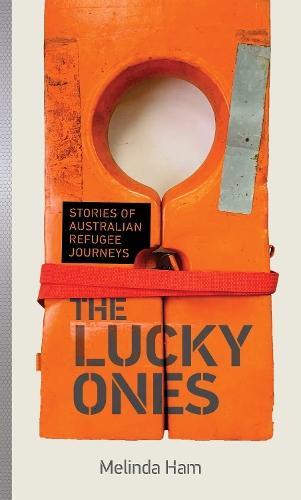
These stories of refugees who have found new lives in Australia encompass enormous suffering, courage, and determination to survive.
‘We are not numbers or statistics. We fled from our homelands because we were standing up for what we believed was right. We had no choice, no choice at all but to flee for our lives. We are the lucky ones who left, and found a new country that welcomed us.’
– Lulu, refugee from the Democratic Republic of the Congo
In choosing this quote from one of her six refugee subjects as her epigraph, Melinda Ham establishes herself as a passionate refugee advocate and clarifies the purpose of this book: to deepen our understanding of and compassion for refugees. The key drivers that have forced them from their homelands are persecution, horrifying torture, families in peril, and unimaginable loss; their journeys spurred by the sheer will to survive. Ham, a journalist who emigrated to Australia from Canada via Zambia in 1992, includes her own story, acknowledging that her experience of emigrating as a middle class, professionally qualified woman from a developed democracy is very different from those of her refugee friends.
Ham gathered her tales around kitchen tables, sharing her interviewees’ national delicacies. Her accounts are intimate, touching and powerful, revealing realities that the press rarely report. In particular, these narratives show ‘how politics in Australia and other countries has impacted each family’s refugee experience, their search for freedom and a new future’.
Despite their different nationalities, Ham ‘found commonality with them in our jokes, our joys, our fears, our losses and our sorrows as they described the journeys that had brought them here’. None are well known or famous and all now live seemingly ordinary lives in suburban Australia – but they have lived extraordinary lives.
Meticulously researched, their stories span 70 years:
Maria and Wojeciech were born in pre-World War II Poland. Ham recounts their journey from Nazi-occupied Poland and postwar Europe to the 50 years they lived in Villawood, Sydney, raising their two daughters.
Nikmorgh was born in Afghanistan, but when the Taliban took control of her country in 1996, she was forced to flee at night with her two small children to save their lives. Eventually she settled in Melbourne in 2019.
Tibetans Dolma and Jigme were captured and tortured by Chinese guards when they were couriering messages from Nepal into Tibet.
Rami and Sala fled Iraq after Rami’s parents were beaten by Islamic vigilantes simply for being Mandaeans, an ancient gnostic religious sect.
Kasse and Minh made the perilous boat journey to Indonesia from Vietnam.
Lulu and her husband Jeff worked as human rights activists in Zaire. One day, when Lulu was shopping with her daughter Tshanda, neighbours rushed to tell them to leave the country immediately as Jeff had been arrested. Thus began Lulu and Tshanda’s perilous journey as refugees to Australia.
Ham has divided her narrative into three parts, each describing a particular stage of the refugees’ journeys. For example, the chapters in Part I include ‘The Early Years’ and ‘The Impetus’; Part II, ‘Paradise Lost’, ‘Life in Limbo’ and ‘Boat People’; and Part III, ‘Daughters’ Voices’, ‘Go Back to Where You Came From’ and ‘Hope for the Future? Sahira’s Story’. The individual narratives are broken up under each heading, and I found this method of structuring the stories a little difficult, as for each person I needed to go back to the previous section and reread the earlier part of their story before moving on to the next. Ham explains that she wants her readers to understand the commonalty of experience of many refugees when they flee their homelands, despite cultural, personal and geographical differences. Enduring fear, anxiety and trauma is the price many pay for leaving all that is dear and familiar to seek safe haven in a place far from loved ones.
Importantly, Ham has captured her subjects’ humour, resilience, tenacity and moral strength. They are all well aware that, in finding refuge in Australia and having the opportunity to rebuild their lives and offer their children a future, they are indeed ‘the lucky ones’. As our history of refugee immigration shows, Australia also benefits in acquiring people who go on to be contributing citizens and enhance Australia’s civic, economic, social and spiritual wellbeing. This is an inspiring and deeply moving book.
Melinda Ham The Lucky Ones: Stories of Australian refugee journeys Affirm Press 2024 PB 272pp $34.99
Suzanne Marks is a member of the Board of the Jessie Street National Women’s Library and the Sydney University Chancellor’s Committee. Her professional life has been in equity, human rights, teaching and conflict resolution.
You can buy The Lucky Ones from Abbey’s at a 10% discount by quoting the promotion code NEWTOWNREVIEW or you can buy it from Booktopia.
You can also check if it is available from Newtown Library.
If you’d like to help keep the Newtown Review of Books a free and independent site for book reviews, please consider making a donation. Your support is greatly appreciated.
Tags: Afghanistan, asylum seekers, Canada, emigration, Iraq, Melinda | Ham, persecution, Poland, refugees, refugees in Australia, Tibet, Vietnam, Zaire
Discover more from Newtown Review of Books
Subscribe to get the latest posts sent to your email.






